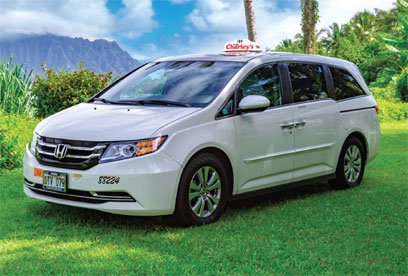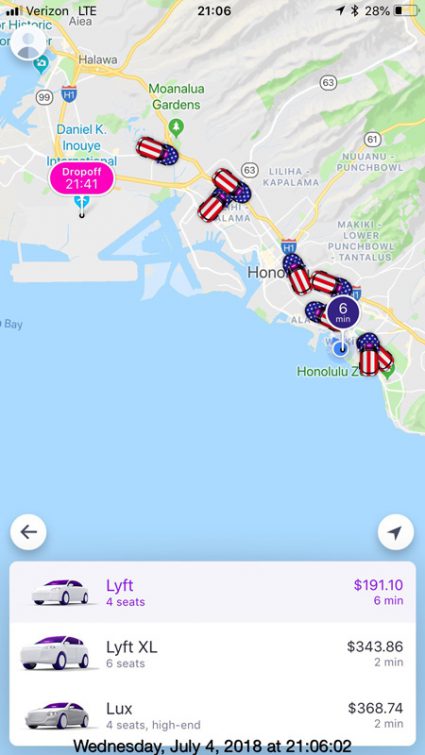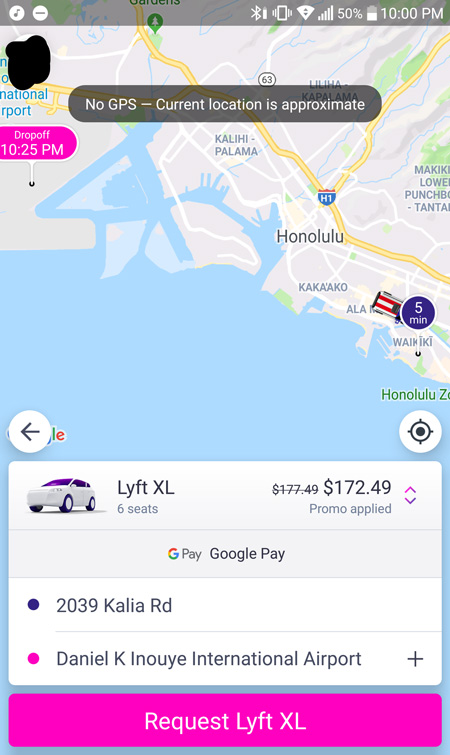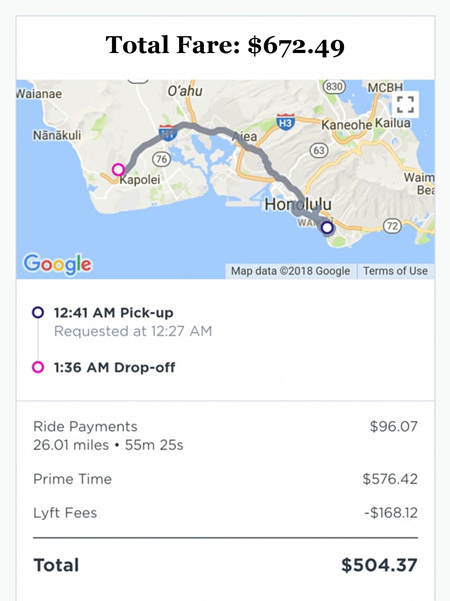
Uber & Lyft Alternative
In 2014, Honolulu’s private transportation options expanded to include Uber and Lyft, known as Transportation Network Companies (TNCs). We have consistently supported Honolulu’s Open Entry system and we support TNC’s free enterprise business model. However, we also strongly support standards of physical fitness and fingerprint qualifications, both of which the TNCs oppose. In short, Charley’s Taxi welcomes competition because we believe our high standards will always have a place.
WHY CHARLEY'S TAXI INSTEAD OF UBER OR LYFT?
Our main concern with how Uber and Lyft operate is safety. Thanks to the City’s repeal of two major safety regulations in 2016, TNC drivers don’t have to take a fingerprint-based background check nor obtain a medical clearance with lab tests.
We believe that requirements like biometric (fingerprint) background checks, commercial insurance, and medical certification are important consumer safeguards that should be restored to law immediately.
Here’s the short story. For more information, please read on past this table.
| PAST | CURRENT | CONSEQUENCE |
| Fingerprint background check. | Name-based check only. | Biometric checks catch disqualifying criminal offenses, name checks do not. |
| Strictly regulated rates. | Taxis rates are regulated. Uber and Lyft are free to charge whatever they want. | Price gouging (aka “Surge Pricing”). |
| Verification of Commercial Insurance Policy. | No verification. | No one knows if a driver is properly insured. |
| Medical certification of fitness to drive. | No medical certification. | Anyone with a license can drive for hire, including those with medical conditions that pose a risk to passengers and the public. |
Did your driver pass a fingerprint background check?
If you’re riding with Charley’s Taxi, yes. We have maintained our high safety standards despite the repeal of a fingerprinting requirement.
With other taxi companies, the answer is most likely, “no.” In an Uber or Lyft, the answer is definitely, “no.”
Is that a big deal? We think it is. Simple name-based checks miss all kinds of important information, even records of violent crimes and sexual assault. When Massachusetts implemented fingerprint background checks in 2017 for all “for hire” drivers, about 11% (8,206 of 71,000) of those already driving for Uber and Lyft failed. Serious offenses uncovered by fingerprinting, and missed by the previous name-based checks, “range from license suspensions to violent crimes and sexual offenses.”
More than 8,000 drivers for ride-hailing companies such as Uber and Lyft have been pulled off Massachusetts roads after failing a new state background check, for infractions that range from license suspensions to violent crimes and sexual offenses, according to records released Wednesday.
The state reviewed the criminal and driving records of nearly 71,000 drivers who had already passed reviews by the companies, and rejected 8,206 — about 11 percent.
Hundreds were disqualified for having serious crimes on their record, including violent or sexual offenses, and others for driving-related offenses, such as drunken driving or reckless driving, according to the state Department of Public Utilities.
The agency said it rejected 51 applications from sex offenders and 352 for incidents related to “Sex, Abuse, and Exploitation.”
In addition to fingerprinting, Charley’s Taxi conducts an FBI background check and requires INS work authorization.
Does your Uber or Lyft driver have insurance that covers driving for hire?
Again, the answer is most likely “no.” While an add-on policy is available, the City does not require Uber/Lyft drivers to show proof of this extra coverage. Because the right coverage costs extra and there is no enforcement the odds are high that Uber/Lyft drivers are not covered during the “gap” period when they’re cruising for passengers. This puts everyone at risk because if a driver gets into an accident during this highly distracted gap period any victims will not have recourse to an insurance claim.
If such an accident should occur on City or State property, a victim’s best legal option is to sue the City or State for their negligence in enforcing insurance requirements. That puts the financial burden on all of us.
Charley’s Taxi drivers are insured at double the coverage as compared to the incomplete insurance provided by Uber and Lyft.
Is your driver medically fit to drive?
Charley’s Taxi drivers must still be certified by a Hawaii-licensed doctor. Other taxi drivers are now free to skip this important safety certification. Uber/Lyft drivers were never required to follow this rule.
Are you seeing a pattern? The City has dropped the previously required basic physical test designed to evaluate a driver’s fitness to drive. All that’s required now is a driver’s license. For hire drivers not only do a lot more driving than average, they should also be able to perform basic duties like helping passengers load luggage, or helping passenger enter and exit a vehicle.
According to this Driver Qualification and Training Personnel Manual (PDF), it appears that the City does understand the value of insurance, medical certification, training, and testing. Yet fingerprinting, insurance, and medical certification have been scrapped. These were all once part of Honolulu’s commitment to safety and service.
The City’s abdication on transportation for hire regulations goes beyond safety. Long-standing rules governing trip-refusal, shortest route, and maximum distance and time rates ensured consumers could trust they were paying a fair rate. The new bills being considered represent a race to the lowest common denominator, not a level playing field.
TAXI RATES VERSUS SURGE PRICING
Do you love surge pricing?
The Mayor and City Council think you do. The City sets a single maximum taxi rate regardless of vehicle cost, but Uber and Lyft are free to charge whatever they think passengers will pay.
Once upon a time, price gouging was not only frowned upon but also strictly prohibited.
On the evening of July 4, 2018, Uber and Lyft rates “surged” to stratospheric heights. At 9:06 that night (top/left screenshot), Lyft quoted an 8-mile ride from Hilton Hawaiian Village to the Airport at $191.10 for 4 passengers and $343.86 for 6 passengers. The city regulated taximeter rate, regardless of passenger capacity, was usually between $35 and $38 at the time.

Nearly an hour later (bottom/right screenshot), at 10pm, the rate for a 6-passenger vehicle was still at $177.49.
That’s just one example of price gouging. Lyft driver receipts show that surge pricing is especially predatory late at night when people who want to drink responsibly can face a $672.49 charge for a 55-minute ride of 26 miles.
If you believe in common sense consumer protections, please contact the Mayor and your City Councilmember. We need your help to show the City that Uber and Lyft do not speak for all of Honolulu. A short comment, which you can use to contact the Mayor and your Councilmember, along with contact information, is available here:
Take Action
